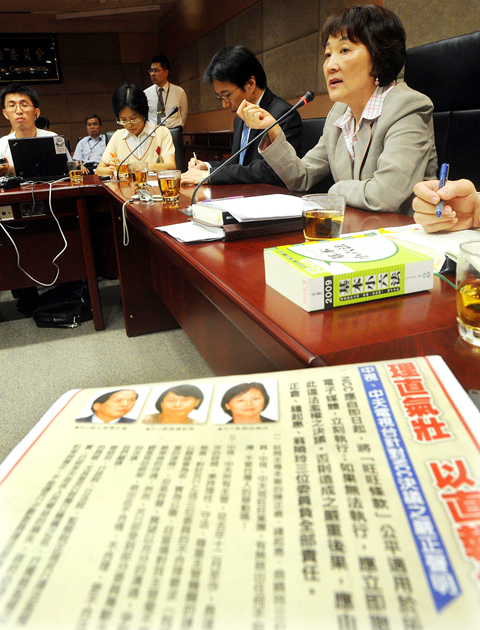Chinese Nationalist Party (KMT) Legislator Alex Tsai (蔡正元) yesterday proposed two bills to establish an exit mechanism for the state public prosecutor-general and National Communications Commission (NCC) members.
Tsai said his proposed amendment to the Organic Act of Court Organization (法院組織法) would authorize the legislature to approve or reject a “no-confidence vote” proposed by the minister of justice should the minister have difficulty working with the state public prosecutor-general.
Tsai said such an option was necessary because there had been a problem with the ranking of the justice minister and the state public prosecutor-general because of how they were nominated.

PHOTO: LIN CHENG-KUNG, TAIPEI TIMES
The president nominates the state public prosecutor-general and the nomination is approved by the legislature, while the premier nominates the justice minister, whose appointment is approved by the president.
Tsai’s proposal would require either the justice minister to either resign or propose a no-confidence vote to resolve a conflict with the prosecutor-general.
Tsai’s proposed amendment to the Organic Act of the NCC (國家通訊傳播委員會組織法) would introduce a similar mechanism for the commission’s chairman, vice chairman or members.
Under this proposal, the chairman, vice chairman or NCC members would have to immediately tender their resignation to the premier after a no-confidence vote proposed by the premier or if one-fourth of the commission members wins the support of more than half of the members.
Tsai said changes were needed to the NCC law because the commission’s handling of the China-based Want Want Group’s takeover of China Television Co (CTV) and CTiTV in the past two weeks was “controversial.”
The commission approved the takeover last Wednesday but set several conditions, including barring the management, directors and supervisors from either TV station concurrently holding a similar position at the other station.
The commission ruled that each network should have at least one independent board director without an affiliation to either the Want Want Group or the China Times Group, the two stations’ parent firm.
The China Times Group was purchased by the Want Want Group last year.
The NCC also stipulated that the two stations’ advertising, sales and programming departments must be separate, and each network must generate its own programming.
In addition, the two networks are not allowed to jointly bid for advertising contracts.
The China Times Group has accused the NCC of abusing its authority.

Alain Robert, known as the "French Spider-Man," praised Alex Honnold as exceptionally well-prepared after the US climber completed a free solo ascent of Taipei 101 yesterday. Robert said Honnold's ascent of the 508m-tall skyscraper in just more than one-and-a-half hours without using safety ropes or equipment was a remarkable achievement. "This is my life," he said in an interview conducted in French, adding that he liked the feeling of being "on the edge of danger." The 63-year-old Frenchman climbed Taipei 101 using ropes in December 2004, taking about four hours to reach the top. On a one-to-10 scale of difficulty, Robert said Taipei 101

Nipah virus infection is to be officially listed as a category 5 notifiable infectious disease in Taiwan in March, while clinical treatment guidelines are being formulated, the Centers for Disease Control (CDC) said yesterday. With Nipah infections being reported in other countries and considering its relatively high fatality rate, the centers on Jan. 16 announced that it would be listed as a notifiable infectious disease to bolster the nation’s systematic early warning system and increase public awareness, the CDC said. Bangladesh reported four fatal cases last year in separate districts, with three linked to raw date palm sap consumption, CDC Epidemic Intelligence

Taiwanese and US defense groups are collaborating to introduce deployable, semi-autonomous manufacturing systems for drones and components in a boost to the nation’s supply chain resilience. Taiwan’s G-Tech Optroelectronics Corp subsidiary GTOC and the US’ Aerkomm Inc on Friday announced an agreement with fellow US-based Firestorm Lab to adopt the latter’s xCell, a technology featuring 3D printers fitted in 6.1m container units. The systems enable aerial platforms and parts to be produced in high volumes from dispersed nodes capable of rapid redeployment, to minimize the risk of enemy strikes and to meet field requirements, they said. Firestorm chief technology officer Ian Muceus said

MORE FALL: An investigation into one of Xi’s key cronies, part of a broader ‘anti-corruption’ drive, indicates that he might have a deep distrust in the military, an expert said China’s latest military purge underscores systemic risks in its shift from collective leadership to sole rule under Chinese President Xi Jinping (習近平), and could disrupt its chain of command and military capabilities, a national security official said yesterday. If decisionmaking within the Chinese Communist Party has become “irrational” under one-man rule, the Taiwan Strait and the regional situation must be approached with extreme caution, given unforeseen risks, they added. The anonymous official made the remarks as China’s Central Military Commission Vice Chairman Zhang Youxia (張又俠) and Joint Staff Department Chief of Staff Liu Zhenli (劉振立) were reportedly being investigated for suspected “serious